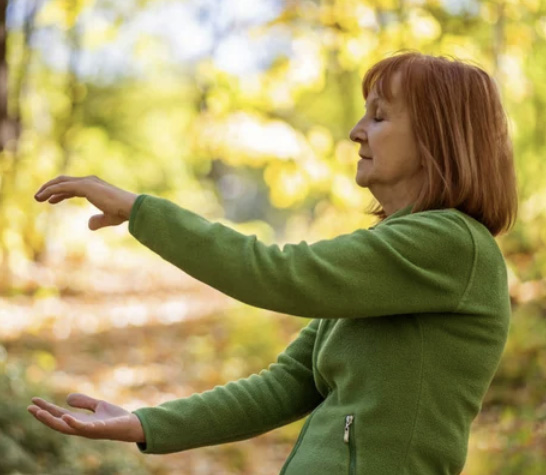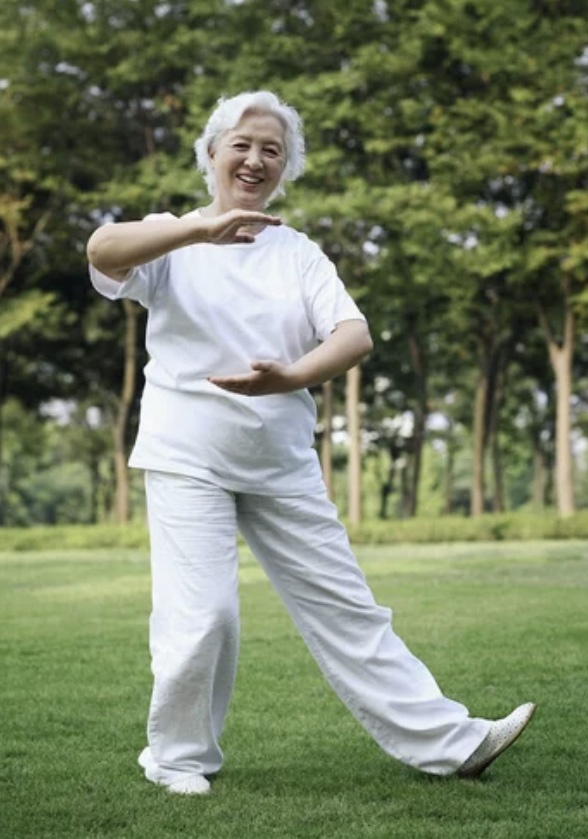.jpg)
Tai Chi for Beginners
This gentle exercise can help maintain strength, balance, and flexibility, making it a perfect activity for the rest of your life!
View our Tai Chi classes here
 Tai Chi is called "meditation in motion," it could also be called "medication in motion." There is growing evidence that this mind-body practice has value in treating or preventing many health problems. And you can get started even if you aren't in top shape or the best health.
Tai Chi is called "meditation in motion," it could also be called "medication in motion." There is growing evidence that this mind-body practice has value in treating or preventing many health problems. And you can get started even if you aren't in top shape or the best health.
In this low-impact, slow-motion exercise, you go without pausing through a series of motions. You breathe deeply and naturally, focusing on your body movements. Tai Chi differs from other types of exercise in several ways. All movements are gentle - not forced; your muscles are relaxed - not tensed; your joints are not fully extended or bent, and connective tissues are not too stretched. Tai Chi is appropriate for everyone, from the most fit to people confined in wheelchairs or recovering from surgery.
Although Tai Chi is slow and gentle, it addresses the main components of fitness — strength, balance, and flexibility. Here's some of the evidence:
-
Strength. Tai Chi can improve both lower-body and upper-body strength. Practicing Tai Chi can be compared to resistance training and brisk walking. Although you aren't working with weights or resistance bands, the unsupported arm exercise strengthens your upper body. Tai Chi strengthens the upper and lower extremities and also the core muscles of the back and abdomen.
-
Balance. Tai Chi improves balance and, according to some studies, reduces falls. Proprioception — the ability to sense the position of your body in space — declines with age. Tai Chi helps train this sense, a function of sensory neurons in the inner ear and stretch receptors in the muscles and ligaments. Tai Chi also improves muscle strength and flexibility, which makes it easier to recover from a stumble. Fear of falling can make you more likely to fall; some studies have found that Tai Chi helps reduce that fear.
-
Flexibility. Tai Chi can increase upper- and lower-body flexibility as well as strength.

Tai Chi Classes at Benwell will include the following:
Warm-up. Easy motions, such as shoulder circles, turning the head from side to side, or rocking back and forth, help you to loosen your muscles and joints and focus on your breath and body.
Instruction and practice of short forms or small sets of movements. A short form with smaller, slower movements is usually practiced initially, especially if you're older or not in good condition.
Breathing exercise. Breath work consists of a few minutes of gentle breathing, sometimes combined with movement. The idea is to help relax the mind and mobilize the body's energy. Breathwork may be practiced standing or sitting.
Check with your doctor. If you have a limiting musculoskeletal problem or medical condition — or if you take medications that can make you dizzy or lightheaded — check with your doctor before starting Tai Chi. Given its excellent safety record, chances are that you'll be encouraged to try it.
Dress comfortably. Choose loose-fitting clothes that don't restrict your range of motion. Footwear should be lightweight, comfortable, and flexible. You'll need shoes that won't slip and can provide enough support to help you balance but have thin soles to allow you to feel the ground. Running shoes and sandals are not suitable.
All classes are in the Wellness Studio on the second floor
This page contains portions of an article from the Harvard Medical School website. No content on this site should ever substitute for direct medical advice from your doctor or other qualified clinician.

